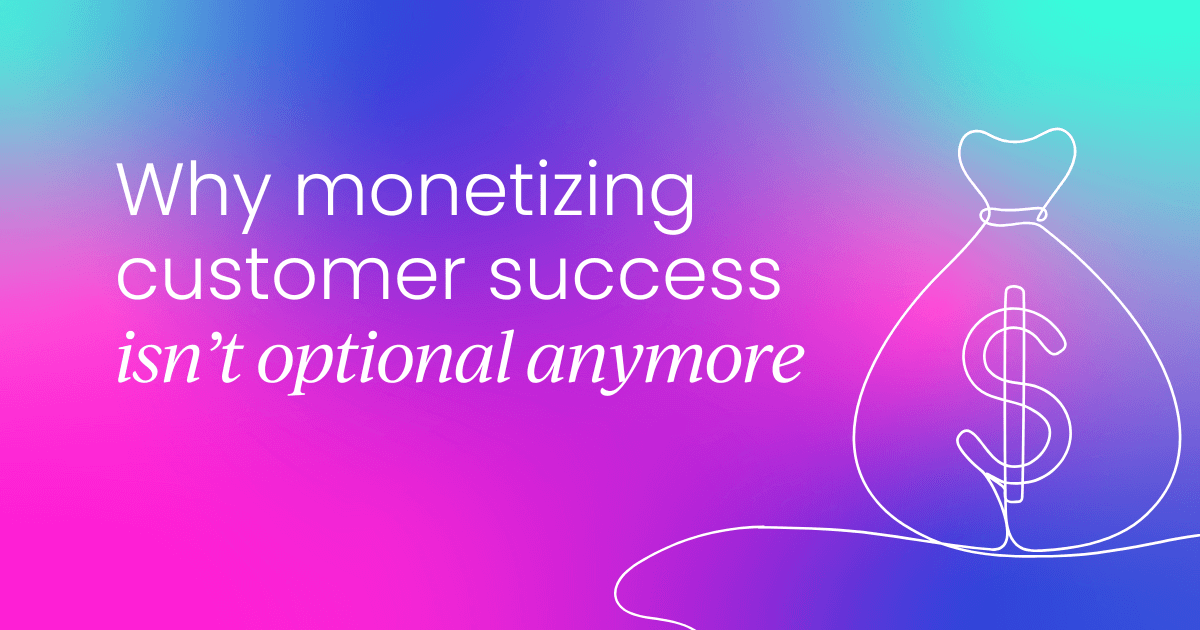For a long time, customer success has been seen as a post-sale support function – important, yes, but often treated as a cost center rather than a growth engine.
That’s starting to change.
I’ve spent nearly two decades in customer success, working across everything from scrappy startups to publicly traded enterprises. Throughout that time, I’ve seen just how powerful CS can be – not only in reducing churn and driving retention, but also in creating real, scalable revenue.
But to do that, we have to reframe how we think about the role customer success plays in the business.
Why monetization matters now more than ever
Let’s start with the honest truth – things haven’t been looking great for customer success lately.
If we zoom in on the period from 2022 to 2024, a lot has changed. A customer success leadership study conducted by ChurnZero and others revealed a concerning trend: net revenue retention (NRR) has been declining.
That’s not all. Customer success teams aren’t growing at the pace they once were. The same study showed that fewer organizations are expanding their customer success headcount. That’s worrying, especially for those of us who are passionate about this industry and want to see it flourish.
While some of these challenges are tied to macroeconomic factors outside our control, there are still levers we can pull. One of those is monetization.
There’s also something deeper happening: the “experience gap.” I believe we’re unintentionally contributing to it. Too often, we fill our CS roles based on headcount availability instead of rethinking whether the model or offer truly fits what the customer needs.
If we want to close that experience gap, we have to listen more closely to our customers. That might mean offering something new, something they’re actually willing to pay for, rather than just assigning another CSM.
When done well, customer success does three powerful things:
- It reduces churn (gross revenue retention, or GRR)
- It drives expansion (net revenue retention, or NRR)
- And it opens the door to monetization
I'm always curious to hear how many organizations are already monetizing customer success in some way. From what I’ve seen, about half of teams are doing something in this space, but for many, that only means charging for professional services like onboarding or implementation. That’s a great start, but there’s so much more potential here.
Can charging for customer success actually help your customers?
Here’s a question I often ask: Can monetizing customer success actually help your customers succeed? In other words, does charging for customer success services drive better outcomes?
In my own experience, the answer is a strong yes.
Back in 2013 or 2014, when I was at Bazaarvoice (a US-owned company operating in the UK), we began monetizing customer success quite early. We started charging for services, and what we saw was fascinating: suddenly, executives who wouldn’t normally give us the time of day were showing up to kickoffs.
They were participating. They were leaning in. Why? Because they were invested.
And with that engagement came impact. We were able to collaborate more effectively, align on goals, and ultimately drive stronger results within their businesses.
That’s something we all struggle with – customer engagement. It's the foundation of success, yet it's one of the hardest things to achieve. We’ve all heard the strategies for re-engaging silent customers or pulling people back into the product.
But if you can create a dynamic where they’re already engaged from day one, because they’ve paid for the service, you’re starting from a place of strength.
This is a big part of why I believe so strongly in monetizing customer success: it creates a natural path to engagement, and engagement is what unlocks outcomes.
On the flip side, there are real risks in not monetizing. The Technology Services Industry Association (TSIA), whose research I really value, highlights several of them:
- Defunding: When CS is always a cost center, it’s an easy target during budget cuts – something we’re seeing more and more of.
- Missed revenue: In an environment where every business is searching for new revenue streams, this is a missed opportunity.
- Stagnation: Continuing to operate the same way without innovation or evolution leads to stagnation. And stagnation isn't just a business risk – it’s a career risk.
So yes, monetization is about revenue, but it's also about relevance, resilience, and results.



 Follow us on LinkedIn
Follow us on LinkedIn



